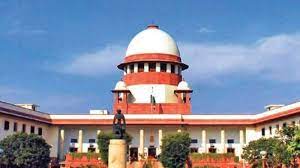NEW DELHI, Oct 20: There should be no trial or investigation based on political rivalry, the Supreme Court said on Friday as it set out to examine a public interest litigation, pointing out how investigations and prosecutions in Tamil Nadu were decided by which political party was in power and, acquittal of state ministers, undermines public faith and confidence in the judicial process.
A bench of justices Surya Kant and Dipankar Datta issued notice to the Tamil Nadu government on a petition filed by a lawyer Karuppiah Gandhi who made 16 ministers in the present Dravida Munnetra Kazhagam (DMK) government and 2 members of parliament facing criminal charges as parties to the petition. Gandhi demanded that investigations into these high-profile cases be transferred to federal agencies such as the Central Bureau of Investigation (CBI) and Enforcement Directorate (ED).
The bench said: “There should be no investigation and trial based on political rivalry. We are trying to maintain a balance between both sides – the people involved on one hand and the society on the other hand.”
For the state government, senior advocate Dushyant Dave appeared along with additional advocate general Amit Anand Tiwari opposing the maintainability of such a petition. “The whole attempt is to get central agencies involved. Entertaining such a petition will create a very wrong precedent. Today opposition-run states are facing a serious challenge. These kinds of petitions are set up. He has a remedy to go to the high court. The Court should not issue notice without ascertaining his antecedents.”
The bench agreed to issue notice only to the state government for now and allowing it to contest the petition’s maintainability. Giving four weeks to the state, the bench also wished to know from the state government to indicate if any case has been taken up against persons irrespective of which political party they belong. “When you are in power, you drag the other party to court,” the bench said.
Dave questioned that the top court cannot ascertain political rivalry as that will require them to examine evidence. Moreover, he pointed out that the petitioner seeks to pursue cases only against one state and should compile details with regard to all central ministers who get acquitted.
The petitioner represented by senior advocate Dama Sesadari Naidu told the Court that his intention was only to highlight the large-scale acquittals of ministers in the state accused of corruption.
“The way the investigation and trial against several Ministers of the current state government have been conducted does not inspire confidence in the minds of the public that a free and fair trial will be conducted by the present prosecution,” he said. He referred to recent orders passed by the Madras high court which took suo moto cognisance of criminal cases against ministers, whose acquittals were not challenged by the state police.
“The manner in which the acquittal orders have been passed raises serious suspicion and undermines the public’s faith and confidence in the judicial process,” the petition added.
The bench noted certain concerns in entertaining the petition against each individual minister. It said, “Some of the orders of acquittal were passed in 2012.Ultimately a question will arise if constitutional courts can reopen cases after so much delay.” Further, the bench observed, “You may be right that the accused are Ministers and wield considerable power. But tomorrow there can be allegation against CBI or any agency which is not proceeding against acquittal.”
The Court felt that an independent agency such as a special investigation team would be better suited to unearth the truth. Dave raised an additional issue questioning which fundamental right of the petitioner has been affected as a PIL before the top court is maintainable for enforcement of fundamental rights. The bench said, “It involves fundamental rights of the society,” as it posted the matter after four weeks.
(Manas Dasgupta)

